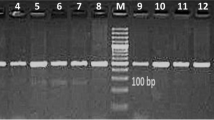Abstract
Livestock specialized cattle breeds combining high energy for both growth and fattening performance are successfully used for high-quality beef production. The use of DNA markers as the additional criteria for sampling and mating the animals allows us to increase the efficiency of selection processes along with improving the meat characteristics of cattle. The objective of the survey was to estimate the effects of leptin gene polymorphism on the growth rates of youngstock and the product quality of beef cattle. The practical science experiment was carried out in 2014–2017. The fattening Hereford and Limousin bull calves (114 and 111 animals, respectively) were genotyped with the technique of polymerase chain reaction (PCR) and subsequent PCR-restriction fragment-length polymorphism analysis (SNP LEP-A422B). A similar genotype distribution among the animals was revealed. Homozygous genotype LEPAA (47.34% and 52.25%, respectively) and allele LEP4 (frequencies of occurrence are 0.68 and 0.71, respectively) are more frequent. The liveweight in both cattle breeds with genotype LEPAA tended to increase at the ages of 8, 12, 16, and 20 months. In addition, an insignificant predominance in body measurements used to assess the proportions of their body parts was ascertained. The analysis of the body conformation indices could indicate harmonious animal development and prove the well-expressed beef forms in the youngstock of all the genotypes for the leptin gene. The postslaughter assessment allowed us to reveal the tendency to increasing the values for the preslaughter liveweight, the hot carcass weight, and the slaughter weight. In addition, the increased carcass yield was recorded in the Hereford bull calves with genotype LEPAA. The surveys ascertained a significant relationship between the analyzed polymorphism and the increases in the internal crude fat weight and the fat yield in the carcasses of bull calves with genotypes LEPAB and LEPBB. The analysis of the morphological composition of Hereford bull calf carcasses revealed a significant relationship between genotype LEPBB and fat contents. Therefore, SNP LEP-A422B genotyping may be used in Hereford and Limousin cattle breeding to improve the meat quality parameters.
Similar content being viewed by others
REFERENCES
Zinov'eva, N.A., Kostyunina, O.V., Gladyr’, E.A., Bannikova, A.D., Kharzinova, V.R., Larionova, P.V., Shavyrina, K.M., and Ernst, L.K., The role of DNA markers of productivity traits in farm animals, Zootekhniya, 2010, no. 1, pp. 8–10.
Komisarek, J., Impact of LEP and LEPR gene polymorphisms on functional traits in Polish Holstein-Friesian cattle, Anim. Sci. Pap. Rep., 2010, vol. 10, pp. 133–141.
Kalashnikova, L.A., Khabibrakhmanova, Ya.A., Pavlova, I.Yu., Ganchenkova, T.B., Dunin, M.I., and Pridanova, I.E., Rekomendatsii po genomnoi otsenke krupnogo rogatogo skota (Recommendations for Genomic Assessment of Cattle), Lesnye Polyany: VNIIPlem, 2015, vol. 35.
Yoon, D.H., Cho, B.H., Park, B.L., Choi, Y.H., Cheong, H.S., Lee, H.K., Chung, E.R., Cheong, I.C., Shin, H.D., Yoon, D.H., Cho, B.H., Park, B.L., Choi, Y.H., Cheong, H.S., Lee, H.K., Chung, E.R., Cheong, I.C., and Shin, H.D., Polymorphic bovine leptin gene, J. Anim. Sci., 2005, vol. 18, no. 11, pp. 1548–1551.
Curi, A., Chardulo, L.A.L., Arrigoni, M.D.B., Silveira, A.C., and Oliveira, H.N., Associations between LEP, DGAT1 and FABP4 gene polymorphisms and carcass and meat traits in Nelore and crossbred beef cattle, Arrigoni Livest. Sci., 2011, no. 135, pp. 244–250.
Buchanan, F.C., Fitzsimmons, C.J., Van Kessel, A.G., Thue, T.D., Winkelman-Sim, D.C., and Schmutz, S.M., Association of a missense mutation in bovine leptin gene with carcass fat content and leptin mRNA levels, Genet. Sel. Evol., 2002, no. 34, pp. 105–116.
Aviles, C., Polvillo, O., Pena, F., Juarez, M., Martinez, A.L., and Molina, A., Associations between DGAT1, FABP4, LEP, RORC, and SCD1 gene polymorphisms and fat deposition in Spanish commercial beef, Anim. Biotechnol., 2015, vol. 26, no. 1, pp. 40–44.
Zwierzchowski, L., Oprzadek, J., and Dymnicki, E., An association of growth hormone, K-caseine, B-lactobolubin, Leptin and PitI loci polymorphism with growth rate and carcass traits in beef cattle, Anim. Sci. Pap. Rep., 2001, vol. 19, no. 1, pp. 65–77.
Anton, I., Kovacs, K., Hollo, G., Farkas, V., Lehel, L., Hajda, Z., and Zsolnai, A., Effect of leptin, DGAT1 and TG gene polymorphisms on the intramuscular fat of angus cattle in Hungary, Livest. Sci., 2011, no. 135, pp. 300–303.
Carvalho, T.D., Siqueira, F., Júnior, R.A.A.T., M-edeiros, S.R., Feijó, G.L.D., Junior, M.D.S., Blecha, I.M.Z., and Soares, C.O., Association of polymorphisms in the leptin and thyroglobulin genes with meat quality and carcass traits in beef cattle, Rev. Bras. Zootec., 2012, vol. 41, no. 10, pp. 2162–2168.
Gizatullin, R.S. and Sedykh, T.A., Adaptive Resource-Saving Technology of Beef Production: Monograph, Saarbrücken: Palmarium Acad. Publ., 2016.
Sedykh, T.A., Kalashnikova, L.A., Gusev, I.V., Pavlova, I.Yu., Gizatullin, R.S., and Dolmatova, I.Yu., Influence of TG5 and LEP gene polymorphism on qualitative meat composition in beef calves, Iraqi J. Vet. Sci., 2016, vol. 30, no. 2, pp. 41–48.
Sharipov, A.A., Shakirov, Sh.K., Yul’imet’eva, Yu.R., Gafurova, L.I., and Sharipov, A.A., Molecular genetic aspects of beef cattle breeding for meat marbling, Vestn. Myasn. Skotovod., 2014, vol. 2, no. 85, pp. 59–64.
Safina, N.Yu., Yul’met’eva, Yu.R., Akhmetov, T.M., Shakirov, Sh.K., and Zinnatova, F.F., Association of polymorphism of the candidate leptin gene with growth energy and physical development of Holstein cattle, Vet. Vrach, 2017, no. 6, pp. 52–56.
Sharifzadeh, A. and Doosti, A., Investigation of leptin gene polymorphism in Iranian native cattle, Bulg. J. Vet. Med., 2012, vol. 15, no. 2, pp. 86–92.
Author information
Authors and Affiliations
Corresponding author
Ethics declarations
Conflict of interest. The authors declare that they have no conflict of interests.
Statement of welfare of animals. All applicable international, national, and/or institutional guidelines for the care and use of animals were followed. The article does not concern any researches using animals as objects.
Additional information
Translated by O. Zhiryakova
About this article
Cite this article
Sedykh, T.A., Kalashnikova, L.A., Gizatullin, R.S. et al. Effects of Leptin Gene Polymorphism on Beef Cattle Performance. Russ. Agricult. Sci. 46, 614–618 (2020). https://doi.org/10.3103/S1068367420060166
Received:
Revised:
Accepted:
Published:
Issue Date:
DOI: https://doi.org/10.3103/S1068367420060166



